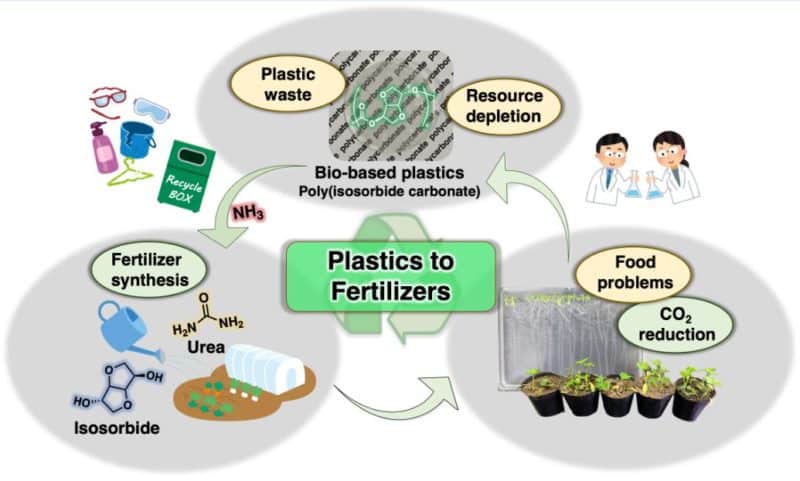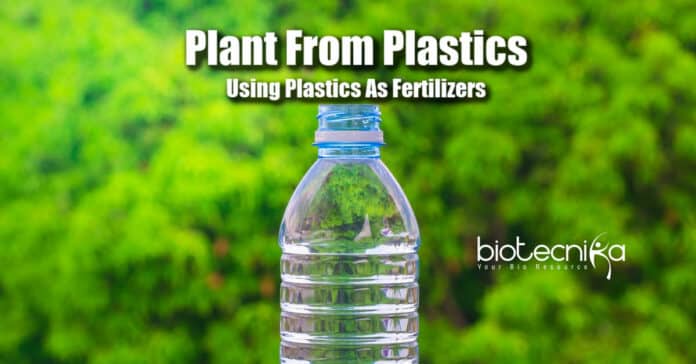Plant from Plastics: Transforming Bio-based Polymers Into Fertilizers
Recently, scientists from the Tokyo Institute of Technology revealed that bioplastics could be chemically recycled into nitrogen-rich fertilizers in an easy and ecologically sound manner. The study findings shed light on long-term circular systems that address plastic pollution, petrochemical resource depletion, and global hunger.
Over the last years, plastics have taken the globe by rage, with usage in almost all aspects of human life. But, the increase of these synthetic polymers, which serve as the foundation for plastics, has added to a slew of severe environmental problems. The most serious of these is the extravagant usage of petrochemical compounds and the disposal of non-biodegradable materials without recycling. Just 14% of all plastic waste is recycled, which barely makes a difference in the issue.
To overcome the plastic problem, a “circular” system has to be created in which the raw materials utilized to make plastics are returned to the source after disposal and recycling. A team of scientists led by Asst Prof Daisuke Aoki and Prof Hideyuki Otsuka, Tokyo Institute of Technology, is exploring a unique idea. Plastics made from biomass (bioplastics) are chemically recycled into fertilizers in their new environmentally friendly method
. This research will be issued in the journal Green Chemistry.
The researchers concentrated on poly (isosorbide carbonate), or “PIC,” a bio-based polycarbonate that has received much spotlight as an option to petroleum-based polycarbonates. Poly (isosorbide carbonate) is produced utilizing a non-toxic material derived from glucose called isosorbide (ISB) as a monomer. The carbonate links that connect the ISB units can be severed utilizing ammonia in an ‘ammonolysis’ method, which yields urea, a nitrogen-rich molecule commonly utilized as a fertilizer. While this chemical reaction is not new to science, some research on polymer degradation has centered on the possible applications of all degradation products rather than just the monomers.
Initially, the team looked into how well full ammonolysis of PIC could be completed in water under moderate conditions (30°C and atm). This choice was made to withdraw the usage of organic solvents and enormous amounts of energy. The researchers meticulously examined all of the reaction products using NMR spectroscopy, FTIR, and GPC.
Eventhough the team could produce urea in this manner, complete degradation of PIC was achieved even after 24 hours, with many ISB derivatives still existing. As a result, the team increased the temperature and observed that complete degradation could be accomplished in about 6 hours at 90°C!
Dr. Aoki stated that the reaction happens without any catalyst, illustrating that the ammonolysis of PIC can be efficiently conducted utilizing aqueous ammonia and heating. As a result, this method is both operationally easy and eco-friendly in terms of chemical recycling.
Ultimately, the researchers carried out plant growth tests with Arabidopsis thaliana to demonstrate that all PIC degradation products can be used as fertilizer. The study concluded that better growth was observed in plants treated with all PIC degradation products than urea-treated plants.
This study’s overall conclusions demonstrate the viability of developing fertilizer-from-plastics systems. The system can help combat pollution, resource exhaustion and help meet the rising food demand.
He further stated that they are satisfied that their study outlines a breakthrough towards producing sustainable and recyclable polymer materials in the coming days. The time of ‘bread made of plastics’ is not so far.
Also Read:
- Ph.D. Mandatory From 2023 For Assistant Professors: UGC
- COVIGENE – Genomic Analysis To Predict COVID-19 Severity
- India To develop Container-based Mobile Hospitals As Part Of PMABHIM
- Two Years Drop In India’s Life Expectancy in 2020 Due To Covid-19
- Predicting Next Virus Spread From Animals to Humans With AI?
- New Secretary of DBT: IISER Professor Rajesh Gokhale
Check out Biotecnika App for more recent Updates, News, and Job vacancies.
Keywords: Plant from Plastics: Transforming Bio-based Polymers Into Fertilizers; Plant from Plastics.






























